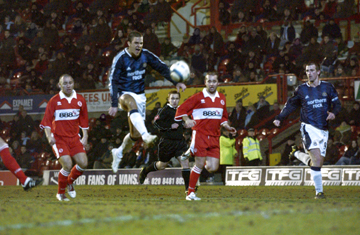 Kuno Becker strikes home against Middlesbrough in ‘Goal! The Dream Begins.’
Kuno Becker strikes home against Middlesbrough in ‘Goal! The Dream Begins.’
|
| Goal! The Dream Begins\r\nStarring Kuno Becker and Stephen Dillane. Directed by Danny Cannon. Written by Mike Jefferies, Adrian Butchart, Dick Clement, and Ian La Frenais. Rated PG. |
|
A D V E R T I S E M E N T
|
|
|
|
A D V E R T I S E M E N T
|
|
How Soccer Explains the World
A Latino kid finds his calling a long way from L.A. in Goal!
By KRISTIAN LIN
A month ahead of the World Cup soccer tournament comes Goal! The Dream Begins, a transatlantic production and the first film in a planned trilogy that’s clearly aimed not just at European soccer fans (who made the movie a mid-sized hit when it came out there last year) but also American audiences who don’t know much about the sport. Speaking as a recent convert to soccer who logs onto www.football365.com every day, I must say I enjoyed the movie quite a bit. Sadly, though, I don’t think that this rather ordinary sports film will transform your average Cowboys fan into a flag-waving, chant-singing devotee of “the beautiful game.”
The main character is Santiago Muñez (Kuno Becker), a Mexican kid whose family illegally takes him across the border in some early scenes that will remind you of the current immigration reform debate. As a young man, Santi lives in L.A., busing tables in a restaurant and working with his dad (Tony Plana) in a landscaping business. In his spare time, he goes to the park with an amateur team and razors through opposing defenses with his trickly dribbling. This captures the attention of Glenn Foy (Stephen Dillane), a former player and scout for the English Premier League club Newcastle United, who does the unthinkable and offers to get the kid a tryout with the team. Against his dad’s wishes, Santi scrapes together enough money to fly to England and see whether his skills measure up.
Soccer has an unusual place in American sports. The rest of the world tends to see it as the poor man’s game — all you really need to play it is a ball — and Latino immigrants in this country and their kids share that view. However, suburban families have embraced it in the last 20 to 30 years as a supposedly less violent alternative to football for their kids. (This is why some ignoramuses here believe it’s a sissy sport. Anyone who thinks soccer isn’t violent should watch a typical English league match.) It would’ve been interesting if the movie had addressed this cultural disjoint and had Santi rubbing shoulders with rich white kids as he worked on his game. Instead, the film’s opening American section bogs down in a totally predictable battle of wills between Santi and his dad, punctuated by some overheated music by Graeme Revell.
The movie picks up considerably when it reaches the U.K. and shows the contrasts in the world of big-time soccer through Santi’s disoriented eyes. A moneyed club stocked with international stars, Newcastle United plays in a frigid industrial city on the northeastern coast where ordinary fans are likely to bump into players at the supermarket or the pub. Think of how Green Bay’s citizens relate to the Packers or San Antonio’s to the Spurs, then imagine that situation duplicated repeatedly across Europe, and you’ll begin to understand why soccer has such a rabid following there. Director Danny Cannon and his team of writers capture an atmosphere that U.S. sports fans will find nicely unfamiliar.
Unfortunately, Santi is a cipher at the center of all this, though perhaps he’ll reveal more of himself in the next two movies. The Mexico City-born Becker displays enough skill to pull that off if he’s given the chance, and the supporting cast does some sharp work with parts that are just unpredictable enough to hold your attention — Anna Friel as a nurse/romantic interest, Marcel Iures as Newcastle’s dourly rumpled German coach, and Alessandro Nivola as the team’s spoiled pretty-boy superstar. (Decked out in a bleached blond hairdo, earrings, and designer suits, Nivola is a dead ringer for David Beckham. The real Beckham shows up here as himself, so you can compare.)
The film adheres strictly to sports-movie conventions, as a rash of player injuries allows Santi to rise quickly from the reserve squad to the bench to the starting lineup. During the game sequences, movie fans will be disappointed to notice the familiar editing tricks designed to make Becker and Nivola look like world-class footballers. On the other hand, soccer fans will be amazed to note that the sequences were filmed during actual games, with the actors treading the same field as John Terry, Steven Gerrard, Didier Drogba, and Sami Hyypiä. If you already know those names, you’re the movie’s target audience. If not, you may be lost on occasion. When a balding guy with a weather-creased face approaches Santi in Newcastle’s weight room and asks to be the next to use his machine, you won’t understand why Santi is so awestruck unless you recognize the balding guy as Alan Shearer, one of England’s greatest-ever goal-scorers.
In the end, Goal! is basically a film for die-hard soccer fans. Casual moviegoers who are interested in sports won’t be bored, but if they want to gain a deeper understanding of why the game has fans in every corner of the globe, the real-life matches from Germany in a few weeks will surely have more drama.
 Email this Article...
Email this Article...

